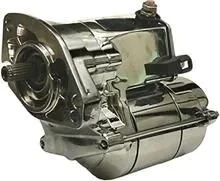Heavy-duty trucks and industrial machines don’t have the luxury of weak starts. They need powerful, reliable starters to crank up massive engines, even in extreme conditions. A failing starter can delay operations, leading to costly downtime. That’s why selecting the right one is crucial for performance and longevity.
In North Carolina, industries depend on high-quality electrical components to keep their vehicles and equipment running. If you're looking for reliable manufacturers, Alternator Starter Manufacturers in NC offer durable solutions for heavy-duty applications.
Key Features to Look for in Heavy-Duty Starters
Not all starters are created equal. When choosing one for your truck or industrial equipment, keep these important factors in mind:
1. Power and Torque Ratings
A heavy-duty starter must generate enough torque to turn over large diesel engines. The power rating should match your engine’s specifications to avoid strain or premature failure.
2. Durability in Harsh Conditions
These starters must withstand extreme temperatures, vibrations, and dirt. Look for models with corrosion-resistant coatings, reinforced housings, and heat-resistant components.
3. Compatibility with Your Vehicle or Equipment
Check if the starter matches your truck’s voltage and engine type. A mismatch can cause electrical failures or inefficient starts.
4. Maintenance and Longevity
Some starters require frequent maintenance, while others come with sealed, maintenance-free designs. Choosing a low-maintenance starter reduces costs and increases reliability.
5. Warranty and Manufacturer Reputation
A good warranty indicates a manufacturer’s confidence in their product. Reputable companies stand behind their products, offering reliable customer support.
Why North Carolina is a Hub for Quality Starters and Alternators
North Carolina is home to top-tier manufacturers specializing in electrical components for heavy-duty trucks and machinery. The state’s strong industrial and automotive sector fuels innovation, ensuring buyers get high-performance solutions. Companies here focus on high-efficiency designs that improve reliability while reducing energy consumption.
Types of Heavy-Duty Starters
Understanding the different types of starters helps in making the right purchase:
1. Direct Drive Starters
These are simple and robust, directly connecting the motor to the engine’s flywheel. They work well for moderate applications but are heavier and consume more power.
2. Gear Reduction Starters
These use a set of gears to reduce the motor’s speed while increasing torque. This design makes them lighter, more efficient, and better suited for high-performance applications.
3. Permanent Magnet Starters
These starters use permanent magnets instead of field coils, making them lighter and more efficient. However, they may not handle extreme conditions as well as other types.
4. Inertia Starters
Common in industrial machinery, these starters rely on a spinning flywheel to store energy before releasing it to the engine. They are durable but require careful handling.
Buying Heavy-Duty Starters Online vs. In-Store
Both online and in-store purchases have advantages.
Buying Online:
- More variety and options.
- Easy to compare prices and specifications.
- Convenient doorstep delivery.
Buying In-Store:
- Physical inspection before purchase.
- Immediate availability.
- Direct customer support.
If you buy online, ensure the seller has good reviews and offers a solid return policy.
Installation Tips for Heavy-Duty Starters
Installing a new starter correctly prevents issues like poor connections or electrical failures. Follow these steps:
- Disconnect the Battery: Always disconnect the power source before working on electrical components.
- Check Mounting and Alignment: Ensure the new starter aligns properly with the flywheel and mounting bolts.
- Tighten All Connections Securely: Loose connections can cause starting failures.
- Test the Starter Before Completing the Installation: Run a test to ensure it engages properly.
- Inspect for Any Warning Signs: Listen for unusual noises or sluggish cranking, which may indicate an issue.
Frequently Asked Questions
1. How long do heavy-duty starters last?
Most last between 100,000 to 150,000 miles, depending on maintenance and usage.
2. Can I install a heavy-duty starter myself?
Yes, if you have basic mechanical skills. However, professional installation is recommended for complex setups.
3. How do I know if my starter is failing?
Common signs include slow cranking, clicking noises, or engine failure to start.
4. Are all heavy-duty starters the same?
No. Different types have varying power outputs, efficiency levels, and durability.
5. Where can I find high-quality heavy-duty starters in North Carolina?
Look for reputable Alternator Starter Manufacturers in NC or check online for certified suppliers.
Final Thoughts:
A high-quality heavy-duty starter ensures smooth operations for trucks and industrial equipment. Whether buying online or locally, always check for power ratings, durability, and compatibility. If you're sourcing reliable components, Superior Quality Starters & Alternators Online offer trusted solutions for heavy-duty applications.



